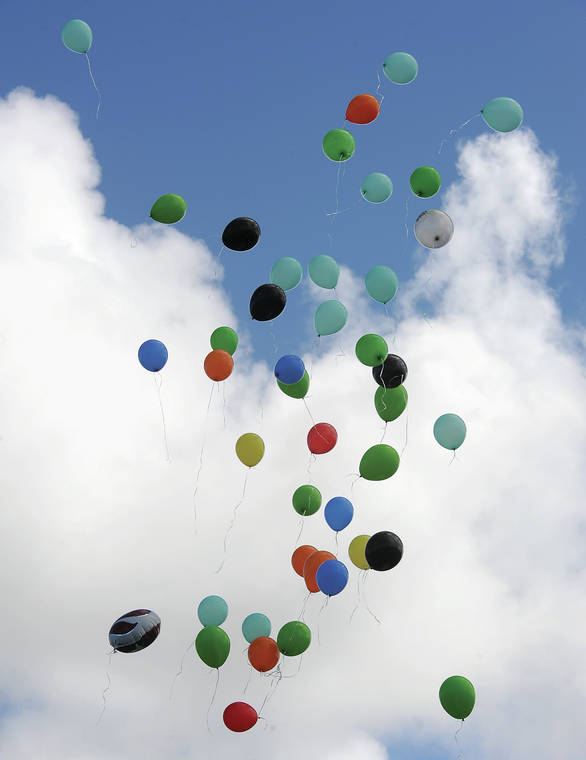Lawmakers pass bill outlawing intentional balloon releases

Scott Saiki

Suzanne Frazer

Graduates families release balloons at Konawaena High School’s drive-through ceremony in 2020. (Laura Ruminski/West Hawaii Today)
A bill banning the intentional release of balloons and establishing a fine for violators who do so is headed to Gov. David Ige for his signature.
A bill banning the intentional release of balloons and establishing a fine for violators who do so is headed to Gov. David Ige for his signature.
House Bill 1102 passed final reading in the House of Representatives Thursday and is now awaiting the governor’s signature. If enacted into law by Ige, it would establish the strongest ban on intentional balloon releases in the U.S. by imposing a $500 fine starting Jan. 1, 2023.
ADVERTISING
The bill was introduced by House Speaker Scott Saiki at the request of the nonprofit organization Beach Environmental Awareness Campaign Hawaii (B.E.A.C.H.). It passed both the House and Senate chambers, before heading into conference where an agreement was reached midweek.
“I want to thank Speaker Saiki and all the lawmakers that have taken this action to prevent balloon litter in the ocean and on beaches and help protect Hawaii’s marine life and sea birds,” Suzanne Frazer with B.E.A.C.H. said in a prepared statement.
A number of states have passed laws related to balloon releases including Maryland, California, Connecticut, Florida, Tennessee and Virginia. Numerous cities and counties also prohibit the release of balloons.
Under the Hawaii measure, exempt are balloons released indoors that stay indoors, hot air balloons and balloons released by the government for scientific or meteorological purposes.
According to B.E.A.C.H., balloon litter is among the most harmful to marine life. Sea turtles, albatrosses and other marine life that eat squid and jellyfish can mistake a balloon in the ocean for food due to the tentacle-like appearance of the plastic ribbons and balloons. When ingested, balloons cause blockages of the gastrointestinal tract that then leads to starvation and death.
Department of Land and Natural Resources Chairperson Suzanne Case added in testimony supporting the measure as it moved through the state Senate that the department recognizes the “deleterious impacts that marine debris, including balloons, has on wildlife and their habitats, leading to an alarming natural resource concern throughout the state.”
She pointed to a University of Tasmania study that found one in three birds out of a sample of 1,733 sea birds, representing 51 different species, had ingested plastic marine debris. Balloons, as soft plastics, posed the highest risk for the sea birds because they can cause fatal obstruction.
“Although a large amount of marine plastic debris arrives from the ocean, it is all of our responsibility to reduce the amount of plastic debris entering and re-entering our ocean and beaches. This bill would help reduce the balloon waste load entering Hawaii’s waters and shorelines and contribute to the improved health of our wildlife and their habitats,” Case wrote.
Kona diver and photographer Doug Perrine, also testifying in support of the bill, said he has pulled many balloons out of the nearshore waters while boating over the years.
“Releasing balloons anywhere in Hawaii is in effect discarding them into the ocean, because that is likely where they will end up. Knowing that such debris can kill even an animal as large and magnificent as the endangered sperm whale gives me a sense of horror when I see people at beach parties releasing dozens or even hundreds of balloons,” he wrote. “This is a crime against nature and should also be a crime in the Hawaii statutes.”
With graduation festivities ahead, B.E.A.C.H. urged residents to turn to other means to celebrate, such as tree planting, giving lei or lighting candles.
“B.E.A.C.H. has found that balloon litter on beaches increases particularly around May and June which is graduation time,” the prepared statement read. “B.E.A.C.H. hopes that with the passage of this bill, more people will become aware of the harm that balloons cause to marine animals and birds and will choose to celebrate or commemorate loved ones in non-harmful ways instead of littering balloons into the air.”


